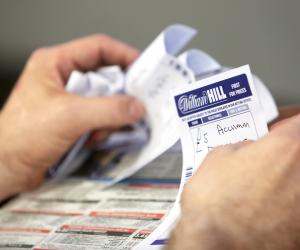 William Hill has seen revenue for the 23 weeks to 9 June fall 32% year-on-year, though the operator claims that recent weeks have shown the business recovering strongly from the disruption caused by novel coronavirus (Covid-19).
William Hill has seen revenue for the 23 weeks to 9 June fall 32% year-on-year, though the operator claims that recent weeks have shown the business recovering strongly from the disruption caused by novel coronavirus (Covid-19).For the first ten weeks of the year, before the pandemic led to its retail estate being shuttered and sporting events suspended, revenue was down 5% from the prior year.
This decline was due to the closure of many retail betting shops, as well as 3% decline in retail revenue from existing shops, while revenue from all other verticals grew. In July 2019, the operator announced plans to close 700 betting shops in the UK after stake limits for fixed-odds betting terminals were reduced to £2.
This was mitigated in part by a 16% rise in online revenue, with UK online’s contribution up 7%, and revenue from international markets growing 35%, aided by the acquisition of MRG Group. The US also performed strongly in this period, with revenue growing 30% year-on-year.
In the following six weeks, however, as Covid-19 spread into Western Europe, resulting in country-wide lockdowns, revenue fell 57%. Online was down 21%, largely due to a 33% drop in the UK, which a 5% year-on-year rise in international online revenue failed to offset.
For retail, with the operator’s shops temporarily closed in this six week period, revenue fell 85%, while the suspension of major US leagues saw revenue plummet 90%.
There were signs of recovery – or at least declines tapering off – in the following six weeks, to 9 June. For this period, revenue was down 50%, with no revenue coming from the retail business, and the US contribution down 62%.
In the states, staking improved as a result of Ultimate Fighting Championship and Nascar returning, and players shifting to betting on events outside of the major US leagues. It would look to build on its position in the US further, by rolling out online casino in New Jersey, William Hill added.
Online’s year-on-year decline shrank to to just 3%, aided by a 7% rise in international revenue, but brought down by an 8% UK drop. This came as sports betting stakes improved as a result of horseracing and the German Bundesliga resuming following Covid-19 enforced shutdowns.
Alternative products such as table tennis also proved popular in this period, and had sustained since the return of racing and football.
“We have been delighted to see a strong recovery in recent weeks with the easing of Covid-19 restrictions and the progressive return of sporting events,” William Hill said.
“We expect the trading backdrop to remain uncertain but are encouraged to see both online and the US performing ahead of our initial expectations.”
Chief executive Ulrik Bengtsson added: ”The return of sporting events has driven a strong recovery in our online volumes.
“Our UK online business is in a better place than ever and our international business is displaying solid growth,” he explained. “In the US we have used this period of lockdown wisely to move our product forward and we are now in a strong position to capitalise on the US growth opportunity that lies ahead.”
The operator said that since its last market update on 15 May, its monthly outgoings had been reduced, and the outstanding £203m on its 2020 bond had been repaid. This, William Hill added, left it with unrestricted liquidity in excess of £500m, allowing it to generate positive cashflow from operating in the second half of the year.
This was aided further by a court case, that will see operators receive a rebate of wrongly-paid value added tax on gaming machines.
At the time, William Hill said that it was liable to have up to £150m repaid, and following discussions with Her Majesty’s Revenue and Customs, expects this repayment in the second half of 2020. It would be “roughly equivalent to the value of the bond repayment”, the operator noted, suggesting that it could be higher than the £150m originally expected.
The operator is looking to further strengthen its financial position through a new share issue of up to 19.99% of its issued share capital to retail and institutional investors.
“This will enable the Group to pursue its long-term growth ambitions, to strengthen its balance sheet and increase its strategic and financial flexibility,” the operator explained.
The placing will be conducted through an accelerated bookbuild, with Barclays Bank and Citigroup Global Markets acting as joint global coordinators and joint bookrunners. William Hill’s directors and members of its senior management team will subscribe for new shares, contributing around £200,000 to the placement.
This additional funding would help the operator mitigate the additional risks caused by the recovery from Covid-19, it explained. Not only did it face potentially damaging factors such as lower retail footfall and a slower recovery in the US, but adverse regulatory developments could also harm the business going forward.
The financial flexibility created by the funding would also allow William Hill to strengthen its position in the US. With regulatory developments expected to ramp up and a number of additional states go live, the operator aims to build on its 24% market share.











